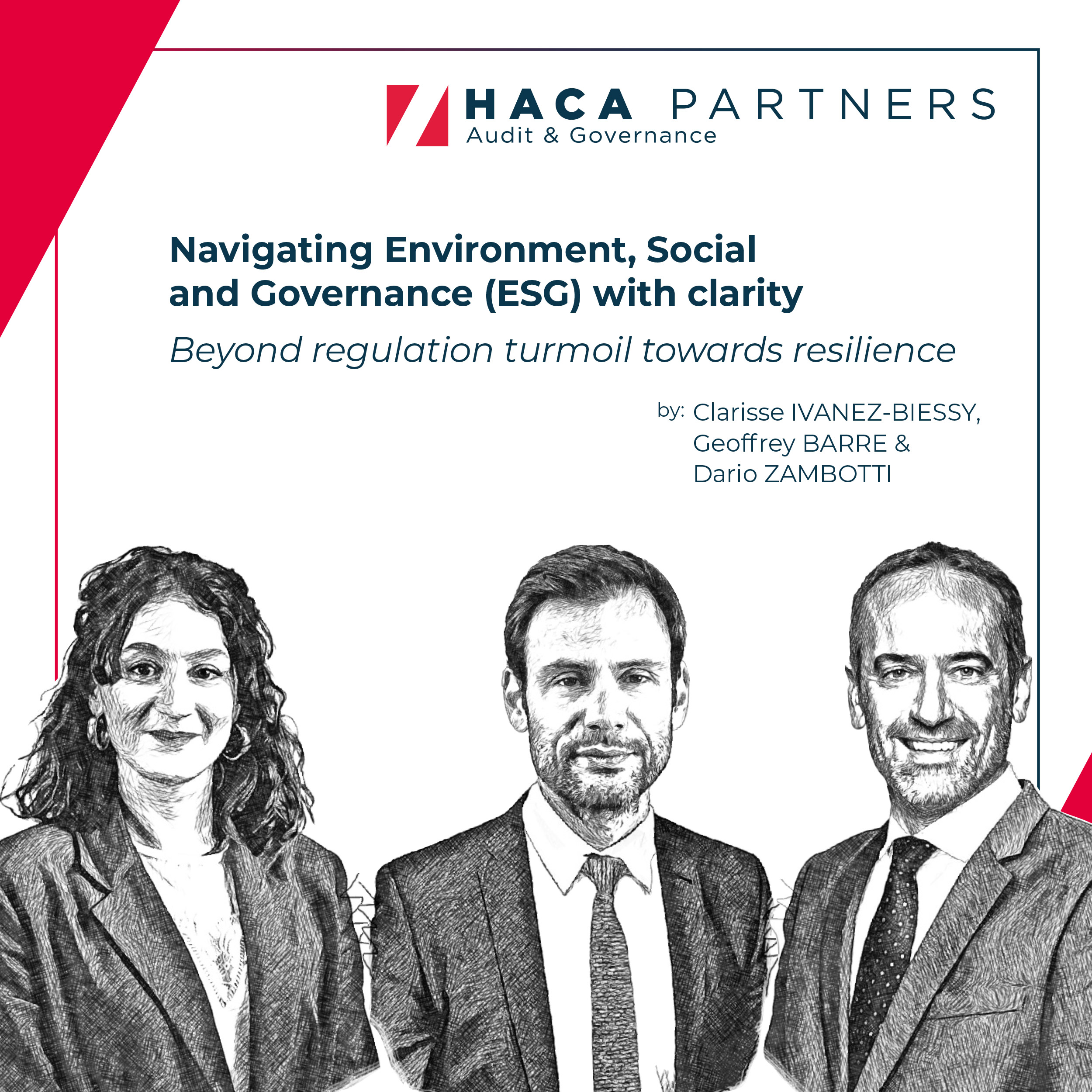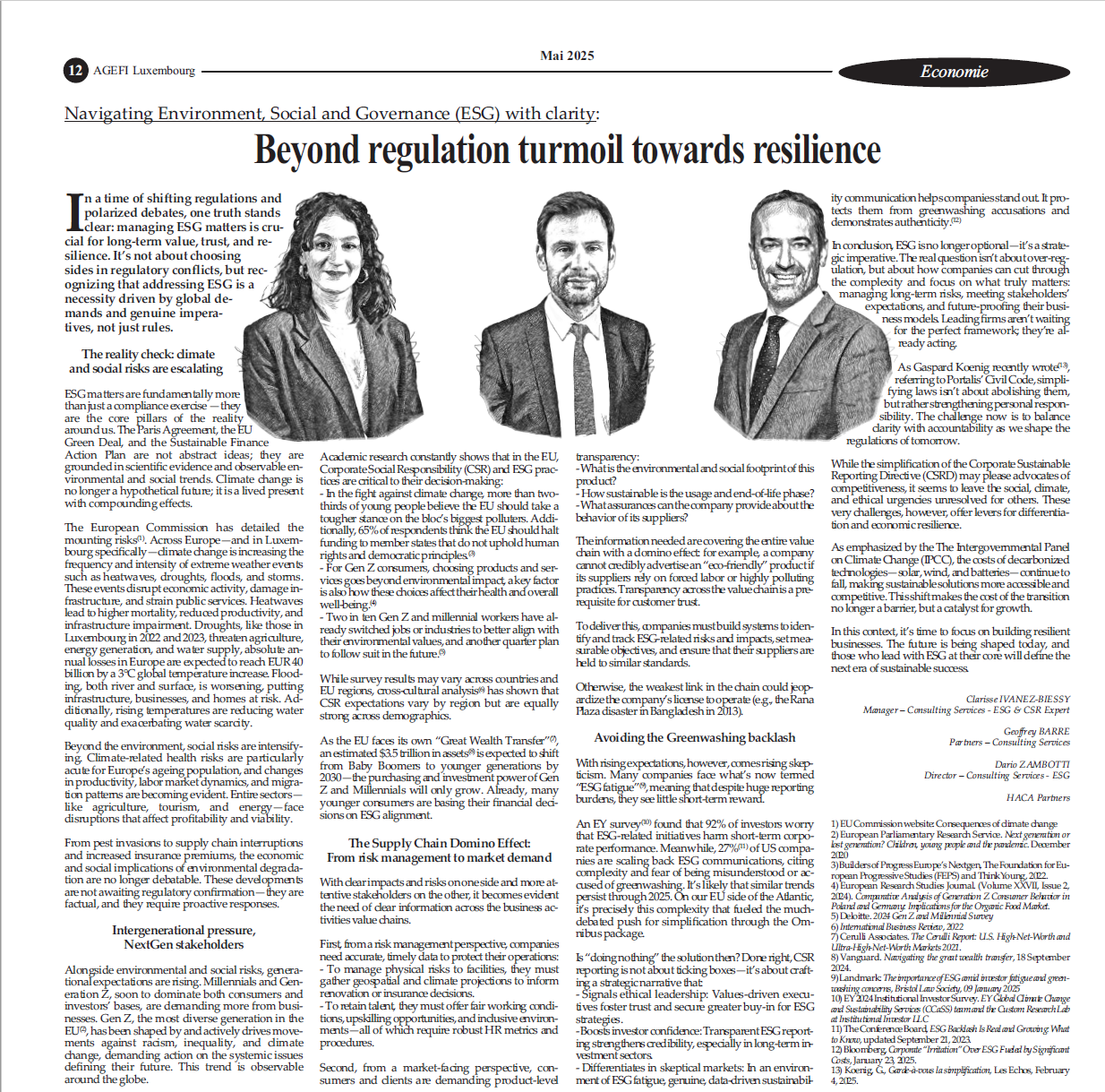16-10-2025 - Clarisse Ivañez-Biessy, Geoffrey Barré, Dario Zambotti
Navigating ESG with clarity: Beyond regulation turmoil towards resilience.
In a time of shifting regulations and polarized debates, one truth stands clear: managing ESG matters is crucial for long-term value, trust, and resilience. It’s not about choosing sides in regulatory conflicts, but recognizing that addressing ESG is a necessity driven by global demands and genuine imperatives, not just rules.

The reality check: climate and social risks are escalating
ESG matters are fundamentally more than just a compliance exercise —they are the core pillars of the reality around us. The Paris Agreement, the EU Green Deal, and the Sustainable Finance Action Plan are not abstract ideas; they are grounded in scientific evidence and observable environmental and social trends. Climate change is no longer a hypothetical future; it is a lived present with compounding effects.
The European Commission has detailed the mounting risks[1]. Across Europe—and in Luxembourg specifically—climate change is increasing the frequency and intensity of extreme weather events such as heatwaves, droughts, floods, and storms. These events disrupt economic activity, damage infrastructure, and strain public services. Heatwaves lead to higher mortality, reduced productivity, and infrastructure impairment. Droughts, like those in Luxembourg in 2022 and 2023, threaten agriculture, energy generation, and water supply, absolute annual losses in Europe are expected to reach EUR 40 billion by a 3°C global temperature increase. Flooding, both river and surface, is worsening, putting infrastructure, businesses, and homes at risk. Additionally, rising temperatures are reducing water quality and exacerbating water scarcity.
Beyond the environment, social risks are intensifying. Climate-related health risks are particularly acute for Europe’s ageing population, and changes in productivity, labor market dynamics, and migration patterns are becoming evident. Entire sectors—like agriculture, tourism, and energy—face disruptions that affect profitability and viability.
From pest invasions to supply chain interruptions and increased insurance premiums, the economic and social implications of environmental degradation are no longer debatable. These developments are not awaiting regulatory confirmation—they are factual, and they require proactive responses.
Intergenerational pressure, NextGen stakeholders
Alongside environmental and social risks, generational expectations are rising. Millennials and Generation Z, soon to dominate both consumers and investors’ bases, are demanding more from businesses.
Gen Z, the most diverse generation in the EU[2], has been shaped by and actively drives movements against racism, inequality, and climate change, demanding action on the systemic issues defining their future. This trend is observable around the globe.
Academic research constantly shows that in the EU, Corporate Social Responsibility (“CSR”) and ESG practices are critical to their decision-making:
- - In the fight against climate change, more than two-thirds of young people believe the EU should take a tougher stance on the bloc’s biggest polluters. Additionally, 65% of respondents think the EU should halt funding to member states that do not uphold human rights and democratic principles.[3]
- - For Gen Z consumers, choosing products and services goes beyond environmental impact, a key factor is also how these choices affect their health and overall well-being.[4]
- - Two in ten Gen Z and millennial workers have already switched jobs or industries to better align with their environmental values, and another quarter plan to follow suit in the future.[5]
While survey results may vary across countries and EU regions, cross-cultural analysis[6] has shown that CSR expectations vary by region but are equally strong across demographics.
As the EU faces its own “Great Wealth Transfer”[7], an estimated $3.5 trillion in assets[8] is expected to shift from Baby Boomers to younger generations by 2030—the purchasing and investment power of Gen Z and Millennials will only grow. Already, many younger consumers are basing their financial decisions on ESG alignment.
The Supply Chain Domino Effect: From risk management to market demand
With clear impacts and risks on one side and more attentive stakeholders on the other, it becomes evident the need of clear information across the business activities value chains.
First, from a risk management perspective, companies need accurate, timely data to protect their operations:
- - To manage physical risks to facilities, they must gather geospatial and climate projections to inform renovation or insurance decisions.
- - To retain talent, they must offer fair working conditions, upskilling opportunities, and inclusive environments—all of which require robust HR metrics and procedures.
Second, from a market-facing perspective, consumers and clients are demanding product-level transparency:
- - What is the environmental and social footprint of this product?
- - How sustainable is the usage and end-of-life phase?
- - What assurances can the company provide about the behavior of its suppliers?
The information needed are covering the entire value chain with a domino effect: for example, a company cannot credibly advertise an “eco-friendly” product if its suppliers rely on forced labor or highly polluting practices. Transparency across the value chain is a prerequisite for customer trust.
To deliver this, companies must build systems to identify and track ESG-related risks and impacts, set measurable objectives, and ensure that their suppliers are held to similar standards.
Otherwise, the weakest link in the chain could jeopardize the company’s license to operate (e.g., the Rana Plaza disaster in Bangladesh in 2013).
Avoiding the Greenwashing backlash
With rising expectations, however, comes rising skepticism. Many companies face what’s now termed “ESG fatigue”[9], meaning that despite huge reporting burdens, they see little short-term reward.
An EY survey[10] found that 92% of investors worry that ESG-related initiatives harm short-term corporate performance. Meanwhile, 27%[11] of US companies are scaling back ESG communications, citing complexity and fear of being misunderstood or accused of greenwashing. It’s likely that similar trends persist through 2025. On our EU side of the Atlantic, it’s precisely this complexity that fueled the much-debated push for simplification through the Omnibus package.
Is “doing nothing” the solution then? Done right, CSR reporting is not about ticking boxes—it’s about crafting a strategic narrative that:
- - Signals ethical leadership: Values-driven executives foster trust and secure greater buy-in for ESG strategies.
- - Boosts investor confidence: Transparent ESG reporting strengthens credibility, especially in long-term investment sectors.
- - Differentiates in skeptical markets: In an environment of ESG fatigue, genuine, data-driven sustainability communication helps companies stand out. It protects them from greenwashing accusations and demonstrates authenticity.[12]
In conclusion, ESG is no longer optional—it's a strategic imperative. The real question isn’t about over-regulation, but about how companies can cut through the complexity and focus on what truly matters: managing long-term risks, meeting stakeholders’ expectations, and future-proofing their business models. Leading firms aren’t waiting for the perfect framework; they’re already acting.
As Gaspard Koenig recently wrote[13], referring to Portalis' Civil Code, simplifying laws isn’t about abolishing them, but rather strengthening personal responsibility. The challenge now is to balance clarity with accountability as we shape the regulations of tomorrow.
While the simplification of the Corporate Sustainable Reporting Directive (“CSRD”) may please advocates of competitiveness, it seems to leave the social, climate, and ethical urgencies unresolved for others. These very challenges, however, offer levers for differentiation and economic resilience.
As emphasized by the The Intergovernmental Panel on Climate Change (“IPCC”), the costs of decarbonized technologies—solar, wind, and batteries—continue to fall, making sustainable solutions more accessible and competitive. This shift makes the cost of the transition no longer a barrier, but a catalyst for growth.
In this context, it’s time to focus on building resilient businesses. The future is being shaped today, and those who lead with ESG at their core will define the next era of sustainable success.
[1] EU Commission website: Consequences of climate change
[2] European Parliamentary Research Service. Next generation or lost generation? Children, young people and the pandemic. December 2020
[3] Builders of Progress Europe’s Nextgen, The Foundation for European Progressive Studies (FEPS) and ThinkYoung, 2022.
[4] European Research Studies Journal. (Volume XXVII, Issue 2, 2024). Comparative Analysis of Generation Z Consumer Behavior in Poland and Germany: Implications for the Organic Food Market.
[5] Deloitte. 2024 Gen Z and Millennial Survey
[6] International Business Review, 2022
[7] Cerulli Associates. The Cerulli Report: U.S. High-Net-Worth and Ultra-High-Net-Worth Markets 2021.
[8] Vanguard. Navigating the great wealth transfer, 18 September 2024.
[9] Landmark: The importance of ESG amid investor fatigue and greenwashing concerns, Bristol Law Society, 09 January 2025
[10] EY 2024 Institutional Investor Survey. EY Global Climate Change and Sustainability Services (CCaSS) team and the Custom Research Lab at Institutional Investor LLC
[11] The Conference Board, ESG Backlash Is Real and Growing: What to Know, updated September 21, 2023.
[12] Bloomberg, Corporate “Irritation” Over ESG Fueled by Significant Costs, January 23, 2025.
[13] Koenig, G., Garde-à-vous la simplification, Les Echos, February 4, 2025.
